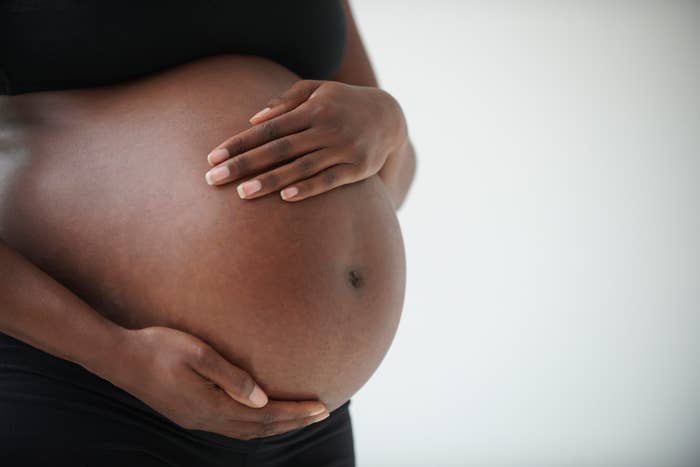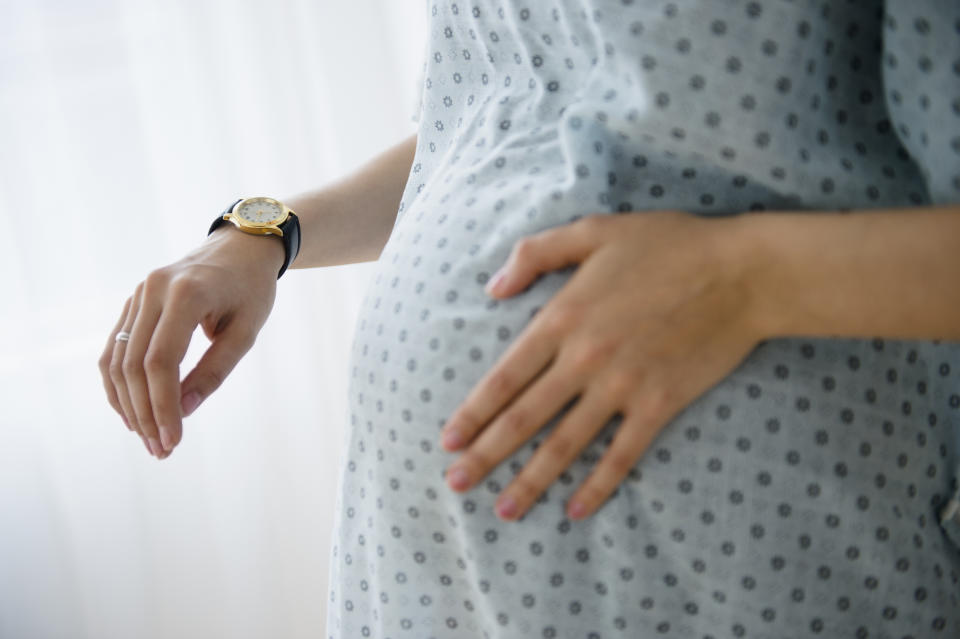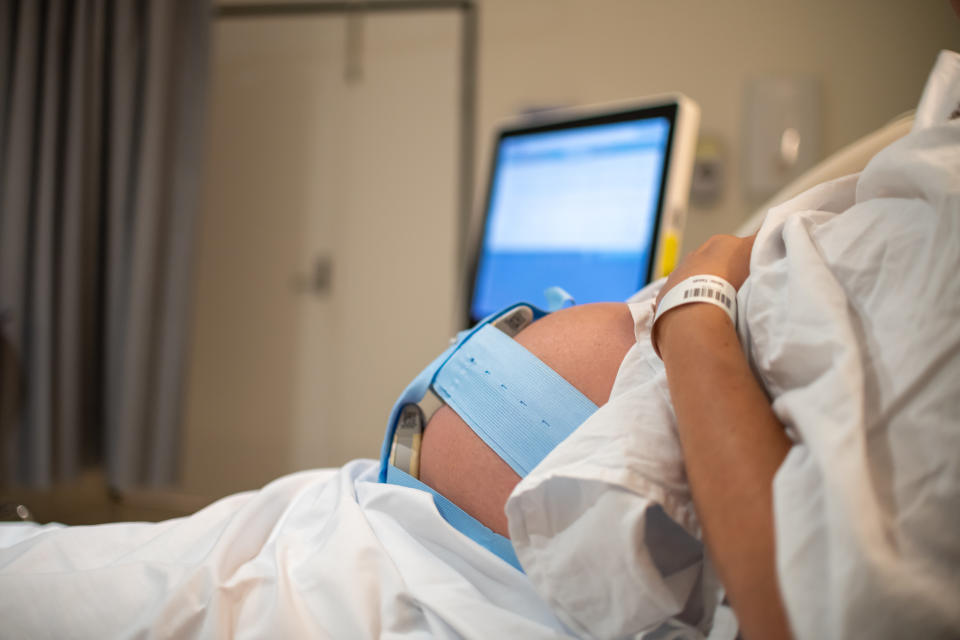This 28-Year-Old Woman Was Diagnosed With Heart Disease Brought On By Pregnancy
No matter how prepared someone tries to be for their first pregnancy, so many things will still be discovered throughout those nine months.

That's exactly what happened to a 28-year-old woman named Emily Naegle (@eminaegle). The content creator and new mom took to her TikTok to share her story of being diagnosed with heart disease, specifically peripartum cardiomyopathy, towards the end of her pregnancy.

Her video, which has garnered almost 500k views, begins with text on the screen that reads, "the story of a girl who ate turkey sandwiches her entire pregnancy and almost died," making it seem like deli meat is what caused her near-death experience.

Technically, deli meat can contain a common bacteria called Listeria, so doctors advise pregnant people not to eat it.
Emily went on to say in her video, "No one told me that the #1 cause of maternal mortality in the US is not only on the rise, but it is heart disease, specifically, cardiomyopathy or a weakened heart muscle. I never heard a word spoken about heart disease in pregnancy."
In Emily's third trimester, she started feeling things that seemed like regular pregnancy symptoms: low blood pressure, low and irregular heart rate, dizziness, lightheadedness, fatigue, and extreme weight gain.

Emily told BuzzFeed that at first, her OB-GYN brushed off what she was feeling "but later apologized for not taking the symptoms more seriously and considering testing for PPCM [peripartum cardiomyopathy] earlier. I had never heard of PPCM, or I would have asked more questions during my third-trimester checkups," she told BuzzFeed.
Emily told BuzzFeed, "When I was in labor, the labor and delivery nurses noticed my heartbeat was irregular. It would be very low, 35-45 bpm, but without me even moving, it would randomly jump up to maybe 80-120 bpm, for example. They recommended I see a cardiologist sometime in the next few months."

"I ended up having a C-section, and everything was seemingly normal. When I was getting ready to leave the hospital to go home, I collapsed. Doctors did an EKG, and it was abnormal. They then did an echocardiogram and found my heart to be enlarged and weakened. My echocardiogram showed my heart was enlarged with an EF [ejection fraction] of 35%. Normal is 55% or higher," she continued.
It was then that Emily was diagnosed with peripartum cardiomyopathy (PPCM). She didn't have any prior heart-related issues, nor did she have any family history of it.

PPCM is often tricky to diagnose. "Symptoms can come on gradually or quite suddenly and are similar to symptoms of a normal third-trimester pregnancy so that it can go undiagnosed in its more mild forms," cardiologist and founder of Whole Heart Cardiology Dr. Nicole Harkin, MD, FACC, told BuzzFeed.
Emily said getting this diagnosis was emotional. "Once diagnosed with PPCM, there is a high risk of your heart getting weaker with any subsequent pregnancy. My daughter’s birth was a beautiful experience, only for days later to be met with the lowest of lows, being told I could never carry another child. The contrast of the two events was a lot and led to a wide range of emotions."
Dr. Lauren Lastinger, a cardiologist at The Ohio State University Wexner Medical Center, agreed, explaining to BuzzFeed, "In most cases of PPCM, the heart muscle recovers fully back to normal. However, women whose hearts recover still have a 50% chance of recurrent heart failure with subsequent pregnancies, and if so, there is a higher chance the weak heart muscle will not recover fully the second time around."

"In cases where the heart muscle does not fully recover, women have an even higher risk of developing worsening heart failure and up to a 20% chance of dying in subsequent pregnancies," added Dr. Lastinger.
The good news is that PPCM is rare (and can only develop in women who are pregnant or recently postpartum) but the bad news is that there isn't any way to prevent it, according to Dr. Lastinger. "We don’t fully understand why PPCM occurs, so there is no way to prevent it. However, with increased education and recognition of the signs and symptoms of PPCM and education of healthcare providers on the PPCM diagnosis, we hope to increase awareness of the condition, which we hope will lead to earlier diagnosis when it occurs," she explained.
Since her diagnosis, Emily has tried to stay active several days a week and was also put on a low-sodium diet. "I was put on a number of different medications, too. At first, I was on two blood pressure medications as well as a diuretic or water pill to help get the extra fluid off my chest. I have now cut back, and I am only on Metoprolol, a common blood pressure medication, which I will be on for the rest of my life," she told BuzzFeed.
"It makes it tricky because it [the medication] lowers my blood pressure, which can make me feel fatigued, light-headed, and groggy. It has been a bit of trial and error to find the right dose to allow me to keep up with my busy toddler. Overall I am doing well and just grateful to be alive," Emily added.
Dr. Lastinger advises women who have had PPCM to always consult their cardiologist first if they plan to get pregnant again. "I cannot overemphasize the importance of discussing the risk of subsequent pregnancies with their cardiologist. I would also encourage these women to seek out a cardiologist with cardio-obstetrics expertise to ensure they receive appropriate counseling," she advised.

Lastly, it's important to note that PPCM is more commonly seen in women of African descent, in pregnancies with multiple gestation (like twins or triplets), and in women who have had pre-eclampsia, eclampsia, or postpartum hypertension (high blood pressure), according to Dr. Lastinger.
As always, you know your body best. If anything feels off, always consult with a doctor and advocate for yourself.

